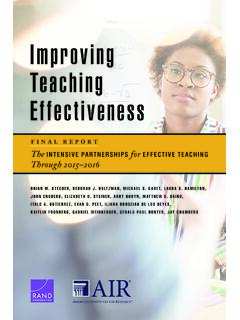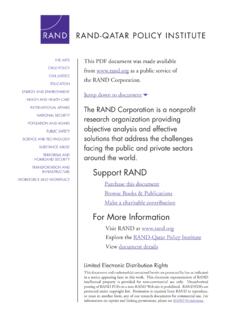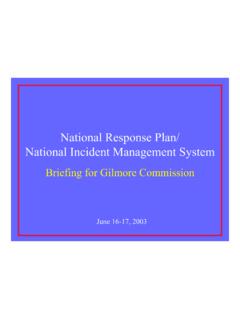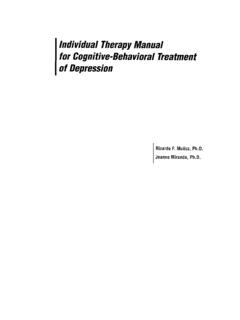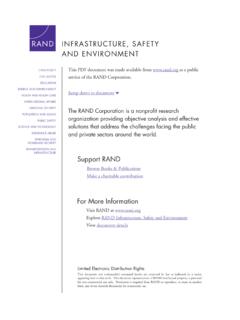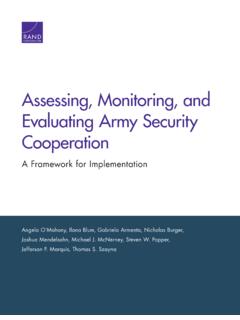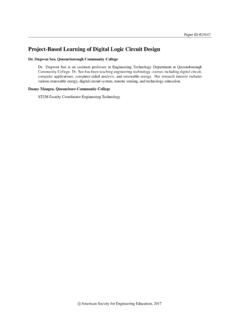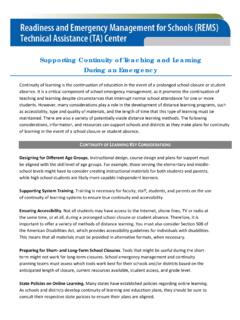Transcription of Digital learning: Education and skills in the digital age
1 An overview of the consultation on Digital learning held as part of the Corsham Institute Thought Leadership Programme 2017 Digital learningEducation and skills in the Digital ageSarah Grand-ClementCORSHAM INSTITUTEFor more information on this publication, visit Published by the RAND Corporation, Santa Monica, Calif., and Cambridge, UK Copyright 2017 RAND Corporation and Corsham InstituteR is a registered trademark. Limited Print and Electronic Distribution Rights This document and trademark(s) contained herein are protected by law. This representation of RAND intellectual property is provided for noncommercial use only. Unauthorized posting of this publication online is prohibited. Permission is given to duplicate this document for personal use only, as long as it is unaltered and complete.
2 Permission is required from RAND to reproduce, or reuse in another form, any of its research documents for commercial use. For information on reprint and linking permissions, please visit report was produced following a consultation at St George s House, as part of a programme of events in the Corsham Institute 2017 Thought Leadership report should be read in conjunction with the Building our Connected Society summary report and the perspective papers from the series (which are available at and ). The consultations in the 2017 programme were: Digital learning : Digital technology s role in enabling skills development for a connected world March 2017 Open science: the citizen s role and contribution to research April 2017 Currency: Redefining the way we transact in a Digital world May 2017 Civic engagement: How can Digital technology encourage greater engagement in civil society?
3 June 2017 This programme hosted at St George s House was developed in partnership by Corsham Institute and RAND Institute (Ci) is a not-for-profit organisation that is working for a fair, inclusive, prosperous and creative society based on trust and security. Europe is a not-for-profit research organisation that helps to improve policy and decision making through research and analysis. RAND Europe s work combines academic rigour with a professional, impact-oriented approach. George s House, Windsor Castle is a place where people of influence and responsibility in every area of society can come together to explore and communicate their views and analysis of contemporary issues. The aim is to effect change for the better in society by nurturing wisdom through dialogue.
4 CORSHAM INSTITUTE3 Foreword1 For more information, visit: or pervasiveness and ubiquity of all things Digital has accelerated over the past 20 years and continues to grow exponentially. Digital technology is becoming increasingly intertwined with everyday life: from schooling and Education , to political engagement and even financial and health management. Developments in Digital technology, and the speed at which they emerge, drive innovation and new applications that touch our lives in different and often profound ways. While there are numerous opportunities and aspirations associated with digitalisation, there is also a crucial need to understand and mitigate the challenges it presents to partnership, Corsham Institute and RAND Europe design and deliver an annual programme of Thought Leadership at St George s House.
5 From its inception in 2016, the aim of the programme has been to explore the opportunities and challenges that Digital technologies are creating within different aspects of Education and skills Consultation on 6 and 7 March 2017 was the first of the four consultations that took place as part of the 2017 Thought Leadership Programme. Other events in the series focused on: Open science Currency and the future of transacting Civic engagement Building our Connected Society , a summary of the key findings identified across the four events in the 2017 Thought Leadership Programme, is published alongside this learningBackground2 See: Devaux, Axelle, Julie Belanger, Sarah Grand-Clement & Catriona Manville.
6 Education : Digital Technology s Role in Ena-bling skills Development for a Connected World. Santa Monica, CA: RAND Corporation, 2017. Digital world is increasingly penetrating the Education and skills domain, with technology gradually being used to deliver Education , knowledge and skills in new and innovative ways. This penetration is coupled with future changes to the mode and pattern of work, which are themselves affected by the current climate of economic uncertainty, as well as by political shifts. Given the increased use of fast-changing Digital technologies in the workplace, new skills needs have emerged. The use of these technologies has contributed to transforming learning and skills development into a lifelong process. Indeed, people now have to continue to develop and refresh their skills and knowledge in order to keep abreast with the constant innovations and new developments in the Digital world.
7 It is estimated that technology skills have to be updated every three years in order to have continued relevance. This applies to the workforce in general, where emphasis is placed not so much on knowing the information, but, rather, on how to find it, and the ability to assess its quality and reliability. Digital technologies have permeated more than just the workplace, however, and possessing Digital skills is often necessary for day-to-day activities, such as booking a doctor s appointment or personal banking. For some members of society, such as Digital natives , using technology is natural, but this is not necessarily the case for all. How do we ensure that every citizen develops the necessary skills to remain active and included in an increasingly Digital society?
8 With these considerations in mind, the overarching question of the consultation was:How can Digital best support everyone in society to develop the skills needed to attain maximum benefit from the use of technology throughout their life?This consultation considered how Digital technology can best support individuals to develop the skills they need to attain maximum benefit in work and social situations. At the same time, it also considered how different stakeholders can help to create stronger societal norms when using Digital technology and to ensure appropriate behaviour online. The consultation was held at St George s House. Our discussions were held under The St George s House Protocol and The Chatham House Rule .2 Participants at the event included senior figures from academia, industry, government and third-sector organisations (for a full list, see page 21).
9 Ahead of the consultation, a short thought-piece was developed for the participants in order to provide background information on some of the issues as well as set the scene for the support this consultation, we conducted youth focus groups prior to the event, collecting views ranging from Year 6 to A-level students (ages 10 to 18). The focus group findings informed our discussions and ensured that the youth perspective was included in our following report gives an overview of the discussions among the participants over the two-day consultation. It aims to capture preliminary ideas as to how Digital learning should be handled, as well as recommendations for further research, on the understanding that not everybody involved in the consultation will necessarily have endorsed all of the proposals and viewpoints reported.
10 51. Necessary skills : Now and in the futureTo create a shared understanding of the topic and the different perspectives in the room, we first discussed which skills are needed for participation in society both in employment and in social participants felt very strongly that the skills shortage is already occurring and that therefore we should focus on skills currently needed, rather than forecasting the needs of the future. Others pointed out that, in general, there is no clear understanding of the skills currently used in the workplace. Companies do not know, or cannot articulate, what skills their workforce has or what skills the company needs to prioritise, and this affects recruitment. Reasons suggested during the discussion include the lack of systematic data collection and analysis by employers on existing skills , especially those skills demonstrated by the most successful employees.
